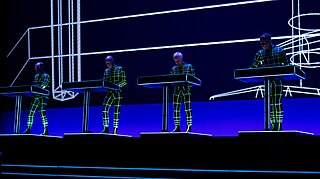
Kraftwerk are a German electronic band formed in Düsseldorf in 1970 by Ralf Hütter and Florian Schneider. Widely considered innovators and pioneers of electronic music, Kraftwerk were among the first successful acts to popularize the genre. The group began as part of West Germany's experimental krautrock scene in the early 1970s before fully embracing electronic instrumentation, including synthesizers, drum machines, and vocoders. Wolfgang Flür joined the band in 1973 and Karl Bartos in 1975, expanding the band to a quartet. Since the band's formation, it has seen numerous lineup changes, with Hütter as its only constant member.

Orchestral Manoeuvres in the Dark (OMD) are an English electronic band formed in the Wirral, Merseyside, in 1978. The group consists of founding duo and principal songwriters Andy McCluskey and Paul Humphreys, along with Martin Cooper and Stuart Kershaw (drums). Regarded as pioneers of electronic music, OMD combined an experimental, minimalist ethos with pop sensibilities, becoming key figures in the emergence of synth-pop; McCluskey and Humphreys also introduced the "synth duo" format to British popular music. In the United States, the band were an early presence in the MTV-driven Second British Invasion.

Autobahn is the fourth studio album by German electronic music band Kraftwerk, released in November 1974 by Philips Records. The album marked several personnel changes in the band, which was initially a duo consisting of Florian Schneider and Ralf Hütter; later, the group added Klaus Röder on guitar and flute, and Wolfgang Flür on percussion. The album also completed the group's transition from the experimental krautrock style of their earlier work to an electronic pop sound consisting mostly of synthesizers and drum machines. Recording started at the group's own Kling Klang facility, but was predominantly made at Conny Plank's studio. Autobahn also includes lyrics and a new look for the group that was suggested by Emil Schult, an associate of Schneider and Hütter.

Electronic were an English alternative dance supergroup formed by singer/guitarist Bernard Sumner and guitarist Johnny Marr. They co-wrote the majority of their output between 1989 and 1998, collaborating with Neil Tennant and Chris Lowe of the Pet Shop Boys on three tracks in their early years, and former Kraftwerk member Karl Bartos on nine songs in 1995.

Radio-Activity is the fifth studio album by German electronic music band Kraftwerk, released in October 1975. The band's first entirely electronic album is also a concept album organized around the themes of radioactive decay and radio communication. All releases of the album were bilingual, with lyrics in both English and German. The album was accompanied by single release of the title track, which was successful in France and Belgium.
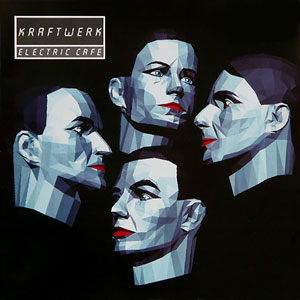
Electric Café is the ninth studio album by German electronic band Kraftwerk, released on 10 November 1986. The initial 1986 release came in versions sung in English and German, as well as a limited Edición Española release, featuring versions of "Techno Pop" and "Sex Object" with only Spanish lyrics. It was the first Kraftwerk LP to be created using predominantly digital musical instruments, although the finished product was still recorded onto analog master tapes.

The Mix is the tenth studio album by the German electronic music band Kraftwerk. It was released on 11 June 1991 by Kling Klang and EMI in Europe and by Elektra Records in North America. It features entirely re-arranged and re-recorded versions of a selection of songs which had originally appeared on Kraftwerk's albums Autobahn (1974) through Electric Café (1986). Some of the songs, such as "The Robots" and "Radioactivity", feature new additional melodies and/or lyrics.

Tony Colman, better known by his stage name London Elektricity, is an English electronic musician and the co-founder and CEO of Hospital Records.
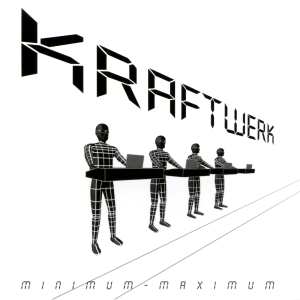
Minimum-Maximum is the first official live album release by Kraftwerk, released in June 2005, almost 35 years after the group gave its first live performance. The album features two CDs of tracks recorded on the group's world tour during 2004, including concerts in Warsaw, Ljubljana, Moscow, Berlin, London, Budapest, Tallinn, Riga, Tokyo, and San Francisco.
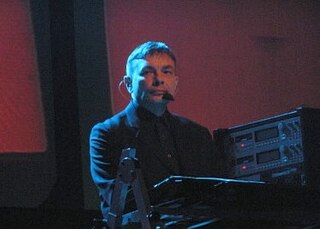
Karl Bartos is a German musician and composer known for his contributions to the electronic band Kraftwerk.

George Andrew McCluskey is an English singer, songwriter, musician and record producer. He is best known as the lead singer and bass guitarist of the electronic band Orchestral Manoeuvres in the Dark (OMD), which he founded alongside keyboard player Paul Humphreys in 1978: McCluskey has been the group's sole constant member. He has sold over 40 million records with OMD, and is regarded as a pioneer of electronic music in the UK. McCluskey is noted for his frenetic onstage "Trainee Teacher Dance".
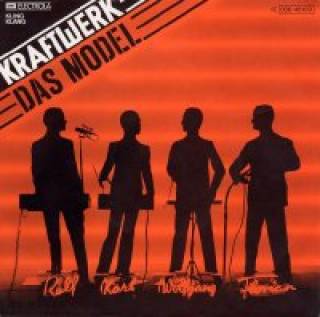
"Das Model" is a song recorded by the German group Kraftwerk in 1978, written by musicians Ralf Hütter and Karl Bartos, with artist Emil Schult collaborating on the lyrics. It is featured on the album, Die Mensch-Maschine.

"Radioactivity" is a song by the German electronic music band Kraftwerk. It was released in May 1976 as the only single from their fifth studio album, Radio-Activity (1975). It sold 500,000 units in France.

Universal is the tenth studio album by English electronic band Orchestral Manoeuvres in the Dark (OMD), released on 2 September 1996 by Virgin Records. Frontman Andy McCluskey opted for a more organic, acoustic sound on the record, which peaked at number 24 on the UK Albums Chart. It was generally well received by music critics, although the British media's overall resistance to OMD – who had been rendered unfashionable by the prevalence of grunge and indie rock – prompted McCluskey to dissolve the group. Universal was their last album until 2010's History of Modern.
Esperanto is an international auxiliary language.
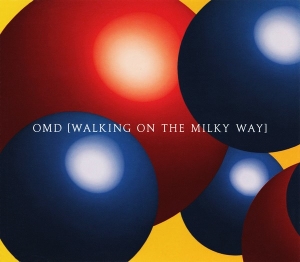
"Walking on the Milky Way" is a song by English electronic band Orchestral Manoeuvres in the Dark (OMD). It was released as a single on 5 August 1996 and appeared on their Universal album a month later. The song reached number 17 on the UK Singles Chart, becoming the group's first UK top-20 hit in over five years, and their last UK top-40 single. The band were flanked by a full string orchestra for their Top of the Pops performance of the song broadcast on 16 August 1996.

Electric Music was the second album by Karl Bartos' "Elektric Music" project, recorded after his collaboration with UK band Electronic on their 1996 album Raise the Pressure and released in 1998. The entire album was written by Bartos and was, according to his website, an "exploration of the sound of the sixties — guitar pop out of the computer!"
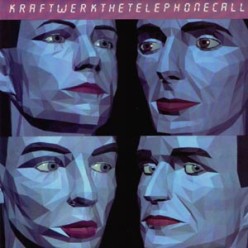
"The Telephone Call" is a song by the German electronic band Kraftwerk. It was released in 1987 as the second and final single from their ninth studio album, Electric Café (1986). The single was their second number-one on the Billboard Hot Dance Club Play and stayed two weeks at the number-one spot. It is the only Kraftwerk song to feature Karl Bartos on vocals. The versions from the single were remixed by François Kevorkian and Ron Saint Germain.

English Electric is the twelfth studio album by English electronic band Orchestral Manoeuvres in the Dark (OMD), and their second since the 2006 reformation of the group. Preceded by lead single "Metroland" on 25 March 2013, it was released on 5 April by 100% Records. Unlike predecessor History of Modern (2010), which was compiled remotely via the Internet, English Electric saw OMD co-founders Andy McCluskey and Paul Humphreys write and record in person, with the aim of recreating their artistic chemistry in years past. The album was largely inspired by McCluskey's then-recent divorce.
Bureau B is an independent record label, music publisher and booking agency from Hamburg, Germany, founded in 2005 by Gunther Buskies as a sister label to Tapete Records. The label releases varieties of electronic, free-spirited music, with the spectrum ranging from pop to avant-garde. The label has amassed an extensive catalogue of reissues and new productions, including classics from the genre of electronic music in the 1970s and early 1980s popularly classified as Krautrock, alongside new recordings by such formative artists as Faust, Kreidler, Roedelius, Tietchens, Moebius.


















